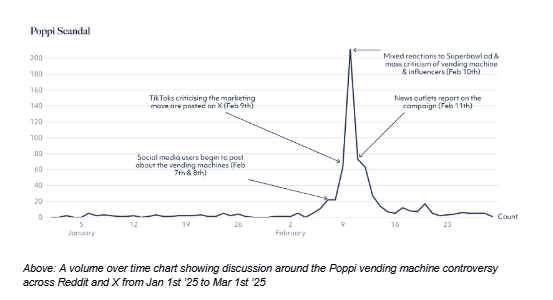
The carefully cultivated image of fashion retailer Revolve now faces a serious test. A $50 million class-action lawsuit alleges that the billion-dollar brand orchestrated deceptive marketing by having social media personalities promote products without disclosing their paid relationships.
For a company whose success was built on thousands of influencer partnerships across digital platforms, these allegations challenge the authenticity at the core of its business model. As this story unfolds, it offers a stark reminder of how quickly a brand's reputation can shift in today's news cycle.
Crisis communications strategies are increasingly failing to keep pace with the rapid pace of digital conversation. While teams meticulously craft press statements and navigate approval processes, social platforms have already shaped public opinion. The window for effective response has collapsed from days to hours. In an era where every brand will inevitably weather some form of social media storm, conventional approaches simply cannot keep pace. How can organizations respond with sufficient speed and authenticity while still building lasting business value?
The Social Media Pressure Cooker
Consider Poppi, the prebiotic soda brand that faced backlash when it sent full-sized hot pink vending machines to influencers' homes ahead of the Super Bowl. What started as a marketing stunt transformed into accusations of tone-deafness within hours. Critics condemned the brand for sending extravagant gifts exclusively to wealthy influencers, rather than sharing them with teachers, nurses, or the general public during challenging economic times. Many reactions focused on perceived inequality and corporate insensitivity.
The speed of the backlash was remarkable. Exclusive data from Storyful Intelligence revealed that discussions about the vending machines increased by 300% within 24 hours, as posts criticizing the marketing move went viral. Just as striking was how quickly interest faded—within 48 hours of the peak conversation, social media mentions had decreased by nearly 70%. This compressed timeline illustrates the rapid lifecycle of modern brand crises.
The sentiment shift was dramatic. Our research found that positive conversations about Poppi nearly tripled in negativity over a single month, from a healthy ratio of 48% positive to 15% negative in January, to an alarming 17% positive and 51% negative by February. This accelerated opinion formation represents a fundamental challenge for brands accustomed to longer response windows.

The New Crisis Playbook
The days when public perception took weeks to form are now a thing of the past. By the time Poppi's founder Allison Ellsworth addressed the scandal with a TikTok video that earned 1.5 million views, the narrative was firmly established. Her response, which asked viewers where the machines should be placed in the future rather than addressing concerns about extravagance, fell short of expectations. The 14,000 comments on her video primarily demanded to know the exact costs. They continued to criticize the concept's perceived wastefulness, evidence that her response failed to address the actual public concerns.
This new reality demands a rethinking of crisis management, starting with a makeover of how brands monitor brewing crises. Most organizations still operate with primitive monitoring that counts mentions but misses these critical sentiment transformations. That's why brands need sophisticated systems that flag when conversations change direction.
This type of misreading points to a critical best practice: sophisticated monitoring must be paired with expert human analysis. Technology alone can't interpret the nuances of public sentiment or the cultural context of criticism.
When Tarte Cosmetics faced backlash over the differential treatment of minority creators, advanced monitoring might have flagged the volume of negative comments. Still, it was human insight that recognized diversity and inclusion as the central concerns, not business logistics. The most effective crisis response teams combine powerful monitoring tools with experienced analysts who can identify the specific values being questioned in a controversy, whether it's corporate excess, environmental impact, or authenticity. This human-technology collaboration is critical to crafting responses that connect with what their audiences truly care about.
Companies must reimagine their crisis response to achieve speed and agility. Traditional approval chains can't match social media's timeline. Stanley's handling of lead allegations in 2024 proves this point. When viral videos claiming its tumblers contained lead garnered millions of views, the company responded with transparency, acknowledging the presence of lead in a sealed component while explaining the safety measures in place. This direct approach maintained consumer confidence and contributed to the dismissal of a related lawsuit. Smart brands now distinguish between solving the issue and crafting the narrative, knowing that transparency builds more trust than delayed messaging.
The Long View
Yet, here's the twist that challenges conventional wisdom: just weeks after Poppi's vending machine controversy, PepsiCo acquired the company for $1.7 billion. Despite February's negative sentiment spike to 51%, Pepsi valued Poppi at 4.2 times its annual sales. Our data shows social media mentions of Poppi on the day of the announcement saw a staggering 2,067% increase compared to the average of all other days from January through March, proving that the acquisition completely reset the brand narrative.
Poppi's story offers a final critical insight: not every social media controversy demands a full crisis response. With mentions dropping 70% within 48 hours of peak outrage, brands must distinguish between viral noise and actual business risk. Sometimes, a minimal response, followed by a return to normal operations, is the best approach. For manufactured outrage, silence may be the wisest strategy. Established brands might even let loyal customers and industry experts defend them, particularly when sentiment is mixed. Success hinges on analytics that can distinguish fleeting social storms from genuine threats to reputation that require action.
The Revolve situation raises profound questions about authenticity in the influencer economy. For a brand that has transformed fashion retail through social media partnerships, addressing these disclosure allegations requires more than legal compliance—it demands reconciling the tension between carefully managed marketing and communications and the increasing transparency that consumers expect. As we've seen with other brands, those who navigate such crises successfully don't just survive the immediate controversy; they emerge with stronger, more resilient systems for managing reputation in a world where public opinion forms in minutes, not days. The question isn't whether your brand will face a social media crisis, but whether you've rebuilt your systems to withstand the new speed of reputation.
Maria Pacheco is CEO at Storyful.
